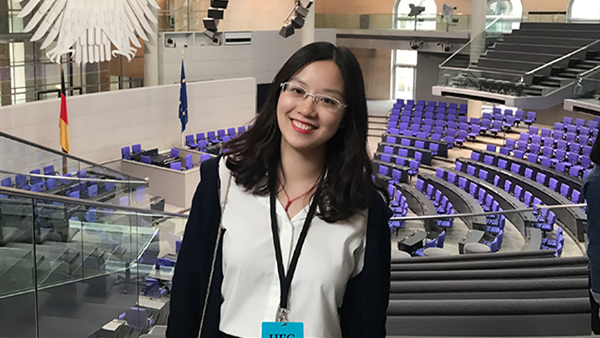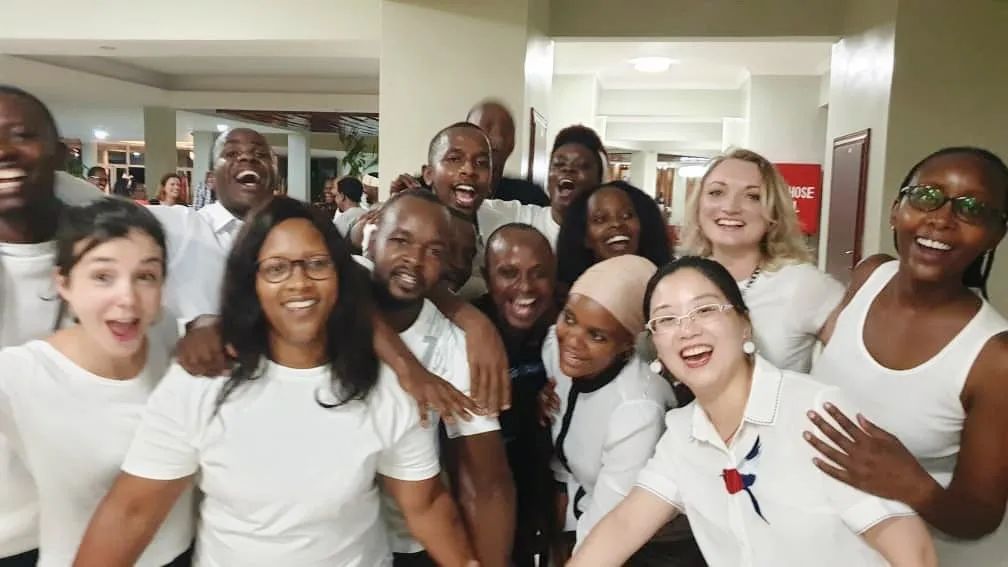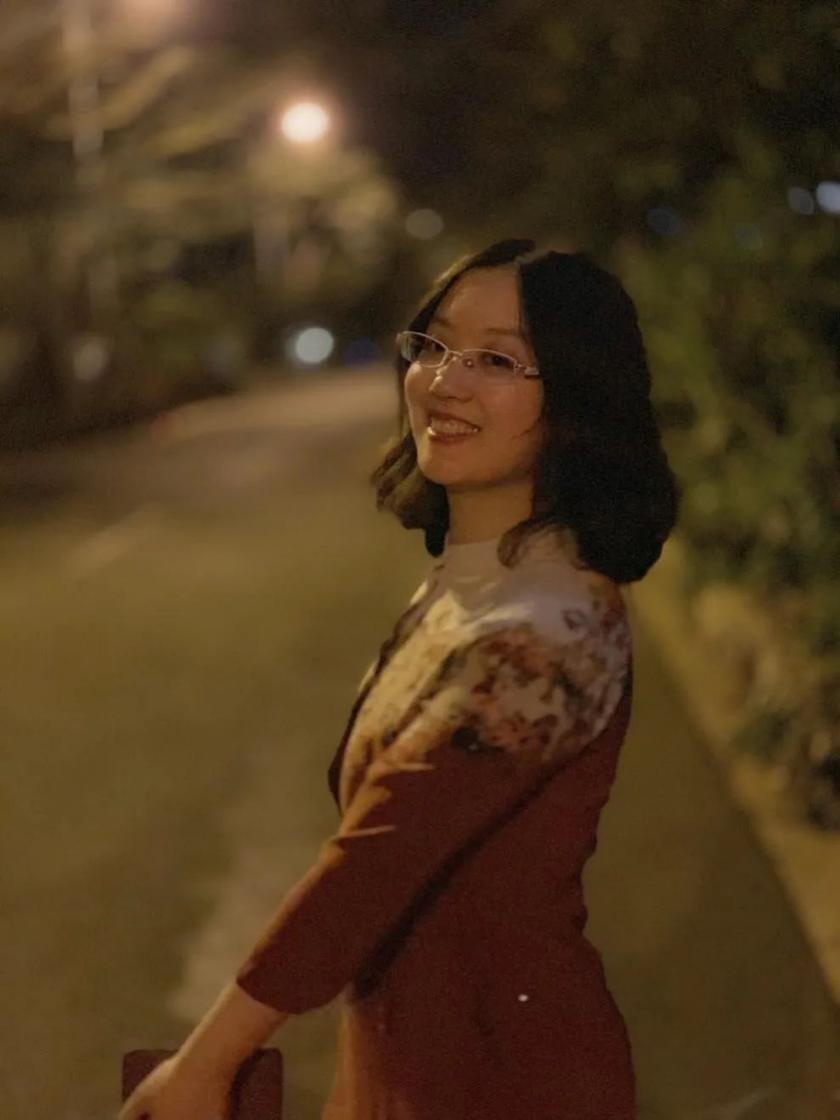

Rwanda, also known as “the land of a thousand hills”, is a landlocked country in East Africa. Its name is derived from its mountain dominated topography. Since the global outbreak of COVID-19, the African nation, which has a population of 12 million and occupies less than 30,000 kilometers of land, has been inundated with a slew of new pressure. As of May 13, the Rwandan Ministry of Health has confirmed 287 cases of COVID-19 in Rwanda.
In the midst of the global fight against COVID-19, Zhu Ruizhi, a Ph.D. candidate from the PKU National School of Development, began to be involved in a refugee protection program in Rwanda as a UN Junior Officer (JPO). With years of experience in refugee protection and a background in interdisciplinary research, Zhu is determined to bring China’s experience in battling COVID-19 to Africa.

Zhu Ruizhi
At undergraduate level, Zhu majored in PPE (Philosophy, Politics, and Economics) at Yuanpei College of Peking University. She has shown how a multi-disciplined background can teach one to empathetically and also pragmatically think about societal issues. Zhu’s research in pedagogy and economics during her masters and now in her doctorate has provided her with the tools needed to investigate the expansion of human capital and the development of a nation from a perspective of educational equity. Last April, she made the decision to head to Rwanda and engage in refugee protection, which was a memorable opportunity offered by the United Nations High Commissioner for Refugees (UNHCR).
Zhu, who was supposed to be on holidays in China earlier this year, was called back to help. Despite the obvious danger, Zhu accepted the call without hesitation. She made the decision to return to Rwanda and lend her hands in refugee support work and the fight against the novel coronavirus.
On her trip to Rwanda, Zhu was faced with an entirely new set of challenges. On top of her usual work, for example maintaining refugee protection services, she was also involved in disease prevention. “Refugee communities are like huge families, and all of the demands of its residents, no matter how big or small, need to be given our full attention,” Zhu said.
Zhu and her team worked day and night to provide the best support possible to the refugees residing in the community. Their duties spanned from the provision of food, nutritional supplements, and utilities such as electricity and water, to helping with newborn baby registrations, the elderly’s access to medical treatment, to name but a few. Sometimes Zhu would jokingly declare her job title to be a farmer or an urban management officer. In the face of the pandemic, maintaining a steady supply of clean drinking water, distributing necessities while avoiding large gatherings, and ensuring the safety of residents and volunteers in the face of supply shortages all presented great hurdles for Zhu and her team.

Zhu Ruizhi and her colleagues
After going through the COVID-19 outbreak in China, Zhu realized the importance of frequent hand washing. To begin with, the team couldn’t figure out why hand washing hadn’t been taken up as a habit by many members of the refugee community. Was it due to a lack of access to running water? Broken taps? Residents didn’t believe the water to be clean enough?
Effective improvements couldn’t be made without first carrying out a proper field investigation. Zhu and her team went door to door to learn more about water usage among local residents and to promote the importance of hand washing. Eventually, their hard work paid off as their early action bore encouraging results. They managed to renovate public washrooms, bathrooms, and the community’s water supply system before the local cases of COVID-19 were reported.
Keeping public washrooms clean posed a particular challenge to the team, especially when COVID-19 is raging across the world. With fear of lack of sanitation in public washrooms, residents were opting to build makeshift latrines inside their own houses. However, this was strongly discouraged as the sanitation of private latrines was hard to control and presented a potential risk to disease control. While carrying out their duties, Zhu and her team surprisingly found that one of the communities always managed to keep their public washrooms clean. Afterwards, they found out that the community had assigned only three households per cubicle who had full responsibility for their assigned toilets, rather than having 10 households all share the entire toilet block. Inspired by the positive results, Zhu and her team began to adopt this approach in surrounding communities, which in turn all saw similar positive changes.

Zhu Ruizhi in a Rwandan refugee community
Before returning to Rwanda, Zhu was worried that China’s efforts in fighting against the pandemic would be overlooked. On the contrary, when Zhu returned to Rwanda from China and started her 14-day quarantine, many colleagues sent her emails and text messages with positive responses to China’s handling of the outbreak. Among these messages were also regards and wishes addressed to Zhu and her family in China and also to all Chinese citizens. She was deeply moved by the messages. “Despite a cacophony of opinions, China’s efforts in controlling the disease did not go unseen in the international community,” Zhu said. Her colleagues in Rwanda all made efforts to debunk any groundless rumors about China. They also worked hard to understand China’s current situation and the preventive measures China had taken in its attempt to control COVID-19. Zhu expressed her gratification towards the scientific and pragmatic approach that had been adopted by China in its response to the viral outbreak.
As soon as Rwanda saw its first case of COVID-19, the government imposed a series of measures to control its spread. Due to restrictions on transportation, going out to purchase supplies and entering the refugee community became even more difficult. In order to ensure residents’ access to resources, the team had to carefully plan out their purchases and ration their supplies. The team also had to develop an effective communication system so as to ensure the residents’ access to the latest information regarding the status of the potential outbreak. With China’s experience in implementing such measures, Zhu and the team gathered all 127 community workers, volunteers, and local autonomous organizations to establish an online platform, on which they could constantly distribute updated information to the community including the latest news from the government, especially from the Ministry of Health. The members were also instructed to promote hygiene and cleanliness among the refugee communities. Although the team’s chances for face-to-face contact had greatly been diminished, they maintained frequent online communication, keeping all members of the team involved and unified.
During her time in Rwanda, Zhu worked day and night. But she never felt burnt out. The smiling faces of the residents never failed to keep her going; the encouragement she received from her colleagues, and the support from her home country thousands of miles away, coupled with warm Rwandan nights, kept motivating her to dedicate herself in Rwanda. As the only Chinese team member, Zhu realized that there were many opportunities for young Chinese people to get involved in international organizations, especially on the frontlines of developing countries.

Zhu Ruizhi in Rwanda
“I grew up in a generation shaped by China’s rapid growth. We witnessed China’s transformation from an impoverished country it once was to the prosperous one it is today,” Zhu said. During this shift, China never stopped striving for new ways of doing things, so Zhu believed there is a lot to learn from this transition. During her time working in Rwanda, Zhu touched upon a unique experience. In the past, people in Rwanda believed that the development of agricultural technologies was crucial, because only then will countries send them the most advanced tractors. But, what if no one knows how to fix the tractor when it breaks down? The answer is simple. It could only sit there and rust. When China’s agricultural poverty alleviation team arrived in Rwanda, they quickly discovered that the hoes being used were too short, so they lengthened the hoes by 10 centimeters. Over time, this minor change successfully boosted Rwanda’s local farming yields. To Zhu, China always showed great empathy through its international initiatives. This in large part was related to China’s history, having emerged as a once poor nation itself, it had built up a vast system of knowledge over the course of its development. From an economic perspective, it might seem like much of the improvements were marginal, but it was these marginal improvements that had ultimately allowed China to flourish. Zhu hopes that she can continue to put this empathy and knowledge into practice on current and future refugee support programs.
In the face of this global pandemic, no man or country is an island. Zhu believes that every country has their own ways to combat the pandemic and she sincerely hopes that the world is able to stand united and continue to selflessly share new scientific knowledge in the fight against COVID-19. Zhu is also gratified to know that many students from Peking University are now serving in their own communities. “This sense of social responsibility will always course through the veins of every PKUer. We will always uphold these values no matter where we end up,” Zhu said.
The virus knows no borders. The world is in a community with a shared future. The sooner countries around the world come to realize this fact, the sooner they can find strength through unity. The students of PKU have embodied this unity as they reach out across the globe. Through helping a refugee community in Rwanda amid the pandemic, Zhu Ruizhi, who was recently bestowed with “Peking University May Fourth Medal”, the highest honor for PKU students, has shown us first hand that China is willing and ready to contribute to the global battle against COVID-19 in the face of adversity.
Source: PKU News
 Fire brigade in Shanghai holds group wedding
Fire brigade in Shanghai holds group wedding Tourists enjoy ice sculptures in Datan Town, north China
Tourists enjoy ice sculptures in Datan Town, north China Sunset scenery of Dayan Pagoda in Xi'an
Sunset scenery of Dayan Pagoda in Xi'an Tourists have fun at scenic spot in Nanlong Town, NW China
Tourists have fun at scenic spot in Nanlong Town, NW China Harbin attracts tourists by making best use of ice in winter
Harbin attracts tourists by making best use of ice in winter In pics: FIS Alpine Ski Women's World Cup Slalom
In pics: FIS Alpine Ski Women's World Cup Slalom Black-necked cranes rest at reservoir in Lhunzhub County, Lhasa
Black-necked cranes rest at reservoir in Lhunzhub County, Lhasa China's FAST telescope will be available to foreign scientists in April
China's FAST telescope will be available to foreign scientists in April "She power" plays indispensable role in poverty alleviation
"She power" plays indispensable role in poverty alleviation Top 10 world news events of People's Daily in 2020
Top 10 world news events of People's Daily in 2020 Top 10 China news events of People's Daily in 2020
Top 10 China news events of People's Daily in 2020 Top 10 media buzzwords of 2020
Top 10 media buzzwords of 2020 Year-ender:10 major tourism stories of 2020
Year-ender:10 major tourism stories of 2020 No interference in Venezuelan issues
No interference in Venezuelan issues
 Biz prepares for trade spat
Biz prepares for trade spat
 Broadcasting Continent
Broadcasting Continent Australia wins Chinese CEOs as US loses
Australia wins Chinese CEOs as US loses